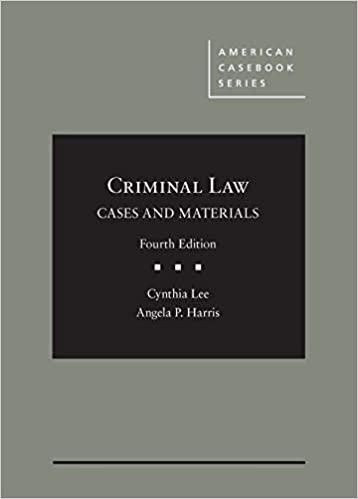Question
MULTIPLE CHOICE 1. Some say that the Commerce Clause is the most important provision of Article I in terms of giving Congress power which is
MULTIPLE CHOICE
1. Some say that the "Commerce Clause" is the most important provision of Article I in terms of giving Congress power which is then transferred to AA, giving them broad powers. The "Commerce Clause" can be described as giving:
A.Congress the Constitutional authority to regulate commerce among the states in areas that are not specifically enumerated in the Constitution as being under the jurisdiction of Congress.
B.legitimacy and authority to Santa Clause to deliver presents
C. AA the authority to adopt rules outside the APA process
D the executive (president) the authority to overrule the Supreme Court.
E. A and C only.
2. The legislature is entitled to influence AA decisions, but not to engage in improper peddling. Which of the following is most true:
- A member of the legislature may bribe AA officials as long as they are performing quasi-legislative activities.
- A member of the legislature may comment on proposed rules.
- A member of the legislature may directly appoint a cabinet agency commissioner.
- Just A and C
- A, B, and C are true.
3. Which of the following statement(s) is/are most true about AA ordermaking and course cases:
- Orders require less standard of proof than required in court (preponderance of the evidence, etc.)
- Court decisions and orders must be based on a record and solely on the record
- A difference between courts and AA is that courts cannot initiate a court case, but AA may initiate an ordermaking proceeding
- A and B but not C
- A, B, and C
4. The main difference between the process that a technical rule follows under Maine's APA and the process a major substantive rule follows is:
- Technical rules must be submitted to the legislature for final approval
- Technical rules must be signed into law by the Governor
- Major substantive rules are provisionally adopted by the AA and then submitted to the legislature for approval, while technical rules can be approved by the AA without going to the legislature
- All rules are major substantive rules and must go back to the legislature for final approval.
- None of the above
5. Which of the following does the legislature use to check the power of AA?
- The enabling act establishing the agency
- The Administrative Procedures Act
- The Freedom of Information/Access Act
- The approval (vote) of an agency's budget
- All of the above
6. Which of the following statement(s) is most true
- U. S. Supreme Court cases trump federal statutes and state statutes.
- State court decisions trump U.S. Supreme Court cases.
- State legislative statutes trump state agency rules.
- Just A and C.
- A, B, and C
7. Which of the following best describes the rulemaking process under Maine's APA
- Proposed rules are "noticed" in newspapers; a comment period follows; the agency must summarize the comments received; and then the agency may finally adopt a technical rule, or if the rule is major substantive, they may provisionally adopt the rule and submit it to the legislature for final approval.
- Proposed rules are "noticed" in the newspapers; they do not have to have a comment period but must hold a hearing; then the agency may finally adopt a technical rule or provisionally adopt a major substantive rule and submit it to the legislature for approval.
- Agencies don't have to "notice" the rule but they must hold a hearing; and finally "adopt" the rule.
- Proposed rules are "noticed" in the papers; agencies must have two comment periods and hold two hearings before they adopt the rule.
8. The difference between how courts treat the Freedom of Access cases versus cases involving AA rulemaking can best be described as:
A. Courts defer to agency decisions when the agency decides not to release information; but courts do not defer to agency decisions for rulemaking.
B. Courts carefully review AA decisions not to release information but defer to agency decisions for rulemaking.
C. Answer B plus the agency has the burden of proof to show why it should not release the information under FOIA.
D. Answer B plus the person challenging the decision not to release info has the burden of proof to show why the agency must release it.
Step by Step Solution
There are 3 Steps involved in it
Step: 1

Get Instant Access to Expert-Tailored Solutions
See step-by-step solutions with expert insights and AI powered tools for academic success
Step: 2

Step: 3

Ace Your Homework with AI
Get the answers you need in no time with our AI-driven, step-by-step assistance
Get Started


